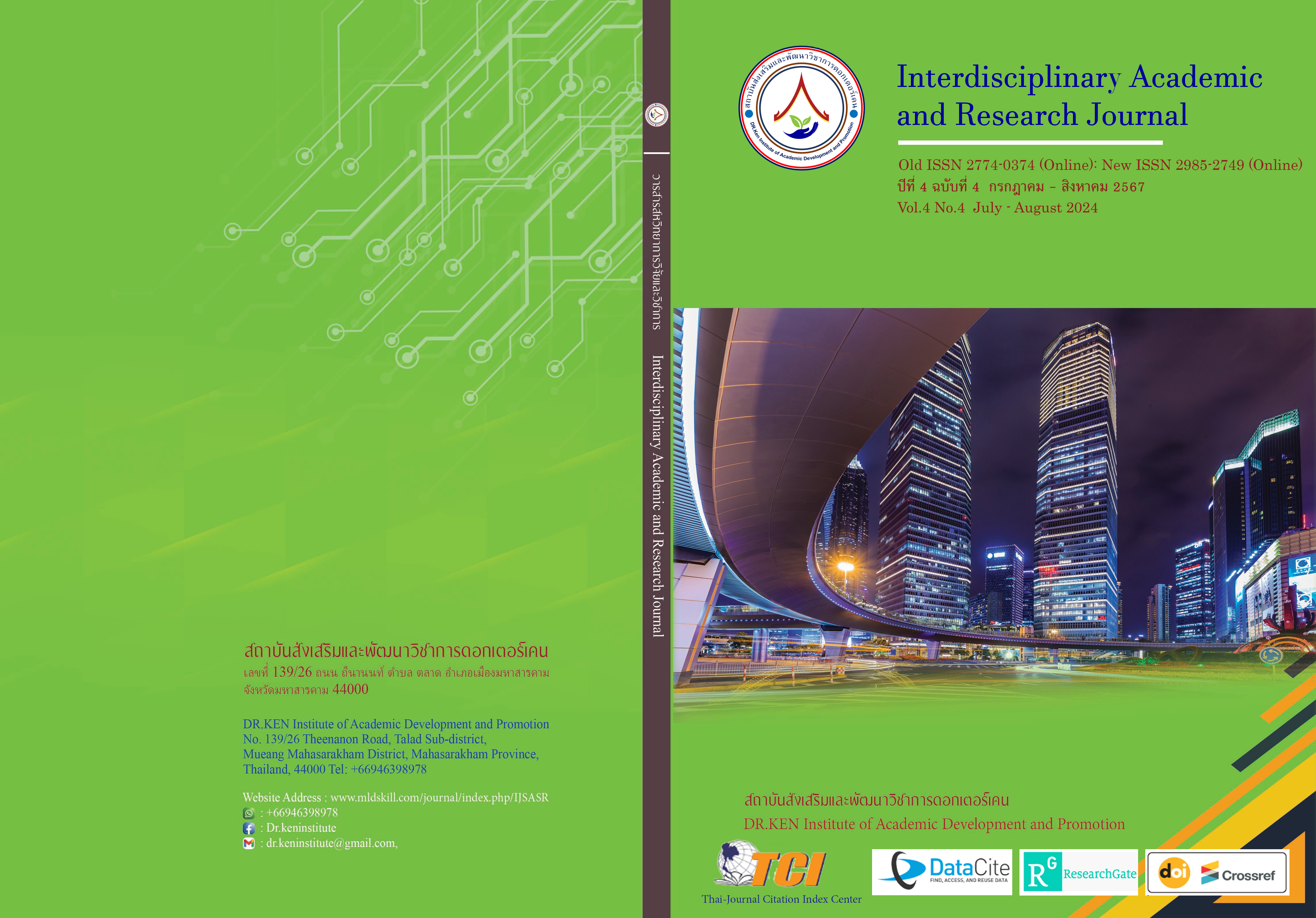The Results of Phenomenon-Based Learning Management to Enhance Life Skills of Early Childhood Children
DOI:
https://doi.org/10.60027/iarj.2024.276694Keywords:
Phenomenon-based Learning Management; , Life skills; , Early Childhood ChildrenAbstract
Background and Aims: Early childhood preparation is development. and encourage children to practice life skills necessary for children to be able to manage their needs and various challenges in daily life effectively Life skills also include the ability to get along with others. Strengthening life skills for early childhood should therefore be cultivated and reinforced from childhood. The purpose of this study was to compare the early childhood life skills before and after organizing learning activities using phenomenon-based learning management.
Methodology: The sample group used in this study were 15 early childhood children, male and female, aged 4 - 5 years, who are currently studying in kindergarten 2, semester 1, the academic year 2023, The Demonstration School of Bansomdejchaopraya Rajabphat University (Kindergarten), Bangkok. They were obtained by accidental sampling. The tools used in the study include a lesson plan of a phenomenon-based learning experience to enhance early childhood life skills and an early childhood life skills assessment form. Data were analyzed using average values, standard deviation, percentage, t-test for dependent sample, and content analysis.
Results: The results of the study found that in early childhood children who received learning management using phenomena as a basis The average life skills score after the experiment was higher than before the experiment. Before the experiment, the mean score was 10.53, standard deviation of 4.81, and after the experiment, the mean score was 25.13, standard deviation of 3.04. The mean score of life skills of early childhood children after organizing learning using phenomenon as a base was significantly higher. Statistics at the .05 level. The results of each aspect of the evaluation are analytical thinking. Decision making problem-solving and communication It was found that the average scores for life skills of most early childhood children before the experiment were at the level that should be developed. Accounted for 80.00 percent, followed by having fair life skills. calculated as 20.00 percent and after the life skills experiment of most early childhood children It's at a very good level. Accounting for 80.00 percent, followed by having moderate life skills. accounting for 13.33 percent and good level accounting for 6.67 percent, respectively. The average life skills score after the experiment was higher than before the experiment with statistical significance at the .05 level in all 4 areas. The suggestions are as follows: 1) Administrators should encourage the creation of an atmosphere in schools that is conducive to the development of life skills of early childhood children. 2) Teachers or related personnel organize activities that promote life skills of early childhood children continuously. both in organizing learning experiences and in daily practice and 3) the school organizes a project to educate parents about life skills training for early childhood children regularly when at home.
Conclusion: The results of the study show that using phenomena-based learning management in early childhood greatly improves life skills. This is demonstrated by a statistically significant increase in average scores after experimentation in all areas assessed. It is advised to create a supportive learning environment in schools, continue life skills-building activities, and regularly conduct parent education programs on early life skills training at home.
References
กรมควบคุมโรค. (2566). กรมควบคุมโรค เปิดสถิติหน้าร้อน ช่วง 5 ปีที่ผ่านมาพบ “เด็กจมน้ำ” กว่า 9 ร้อยรายแนะผู้ปกครองสนับสนุนให้เด็กเรียนว่ายน้ำเพื่อเอาชีวิตรอด. สำนักสารนิเทศ สำนักงานปลัดกระทรวงสาธารณสุข. Retrieved on March 14, 2024, from https://n9.cl/ihqk8t
ชลาธิป สมาหิโต. 2562. การจัดประสบการณ์การเรียนรู้โดยใช้ปรากฏการณ์เป็นฐานสำหรับเด็กปฐมวัย.วารสารมหาวิทยาลัยศิลปากร. 39 (1), 113-129.
บุญชม ศรีสะอาด. (2560). การวิจัยเบื้องต้น. (พิมพ์ครั้งที่10), กรุงเทพ: สุวีริยาสาส์น
ปิยะนันท์ หิรัณย์ชโลทร และ กันตวรรณ มีสมสาร. (2558). การพัฒนาทักษะชีวิตสำหรับเด็กปฐมวัย. นนทบุรี: มหาวิทยาลัยสุโขทัยธรรมาธิราช.
ระพีพรรณ พัฒนาเวช. 2565. พัฒนาทักษะชีวิต. ไทยสมาคมสร้างสรรค์. Retrieved on June 17, 2023, fromhttp://www.taiwisdom.org/artclnchdev/lfskll/chddvpartcl04
รุ่งลาวัลย์ ละอำคา. (2557). ทักษะชีวิตของเด็กปฐมวัย: แก่นแห่งชีวิตที่เสริมสร้างได้จากครอบครัว. วารสารวิจัยเพื่อพัฒนาสังคมและชุมชน. มหาวิทยาลัยราชภัฏมหาสารคาม
เรวณี ชัยเชาวรัตน์. 2020. Phenomenon – Based Learning : การเรียนรู้โดยใช้ปรากฏการณ์เป็นฐาน.Retrieved on October 20, 2022, from https://thepotential.org/knowledge/phenomenon-based-learning/
วรรธนา นันตาเขียน, กุลภัสสรณ์ ตั้งศิริวัฒนากุล และ สุกัลยา สุเฌอ. 2560. ทักษะชีวิตของเด็กปฐมวัยในยุคประเทศไทย 4.0 : LIFE SKILLS OF YOUNG LEARNERS IN THAILAND 4.0. วารสารการศึกษาและการพัฒนาสังคม. 13 (1), 7-18.
ศิริอร นพกิจ. (2561). บทความวิชการการจัดกิจกรรมพัฒนาทักษะชีวิตผู้เรียนในศตวรรษที่ 21. วารสารและพัฒนาหลักสูตร. 8 (1), 53-66.
สำนักงานคณะกรรมการการศึกษาขั้นพื้นฐาน. (2551). การพัฒนาทักษะชีวิตในระบบการศึกษาขั้นพื้นฐาน. Retrieved on June 17, 2023, fromhttp://www.esbuy.net/_files_school/00000883/document/00000883_0_20200811-095828.pdf
สำนักงานคณะกรรมการพัฒนาการเศรษฐกิจและสังคมแห่งชาติ. (2561). ยุทธศาสตร์ชาติ พ.ศ. 2561 – 2580(ฉบับประกาศราชกิจจานุเบกษา). Retrieved on February 11, 2024, fromhttps://www.ratchakitcha.soc.go.th/DATA/PDF/2561/A/082/T_0001.PDF
สุริยะ หาญพิชัย. (2562). การพัฒนาผลสัมฤทธิ์ทางการเรียนในรายวิชาท้องถิ่นศึกษาโดยใช้การเรียนรู้แบบลงมือทำวารสารวิชาการและวิจัยสังคมศาสตร์. 4 (1), 15-26.
องค์การยูนิเซฟ. (2559). ทักษะชีวิต รหัสครูศตวรรษที่ 21 การจัดการเรียนการสอนเพื่อพัฒนาทักษะชีวิตแห่งศตวรรษที่ 21. Retrieved on June 17, 2023, from https://n9.cl/e6swx
อรพรรณ บุตรกตัญญู. (2561). การเรียนรู้โดยใช้ปรากฏการณ์เป็นฐานเพื่อการสร้างมุมมองแบบองค์รวม และการเข้าถึงโลกแห่งความจริงของผู้เรียน. วารสารครุศาสตร์ จุฬาลงกรณ์มหาวิทยาลัย. 46 (2), 348-365. DOI: https://doi.org/10.58837/CHULA.EDUCU.46.2.19
ออมวจี พิบูลย์, และกิตติชัย สุธาสิโนบล. (2564). การเรียนรู้โดยใช้ปรากฏการณ์เป็นฐานเพื่อการพัฒนาสมรรถนะข้ามพิสัย : กรณีศึกษาประเทศฟินแลนด์. วารสารศิลปะศาสตร์มหาวิทยาลัยเทคโนโลยีราชมงคลสุวรรณภูมิ. 3 (3),414-428.
อัจฉรีย์ พิมพิมูล. (2020). การพัฒนาแบบทดสอบวัดผลสัมฤทธิ์ทางการเรียน วิชาขั้นตอนวิธีและการเขียนโปรแกรม.Retrieved on November 18, 2023, fromhttps://so02.tcithaijo.org/index.php/edubuu/article/view/244352/165616
Daehler, K., & Folsom, J. (2016). Making Sense of Science: Phenomena-based Learning. Retrieved October 5, 2016, from http://www.WestEd.org/mss
World Health Organization. (1997). Life Skills Education for Children and Adolescents in School.Geneva: World Health Organization.
Downloads
Published
How to Cite
Issue
Section
License
Copyright (c) 2024 Interdisciplinary Academic and Research Journal

This work is licensed under a Creative Commons Attribution-NonCommercial-NoDerivatives 4.0 International License.
Copyright on any article in the Interdisciplinary Academic and Research Journal is retained by the author(s) under the under the Creative Commons Attribution-NonCommercial-NoDerivatives 4.0 International License. Permission to use text, content, images, etc. of publication. Any user to read, download, copy, distribute, print, search, or link to the full texts of articles, crawl them for indexing, pass them as data to software, or use them for any other lawful purpose. But do not use it for commercial use or with the intent to benefit any business.
















.png)


